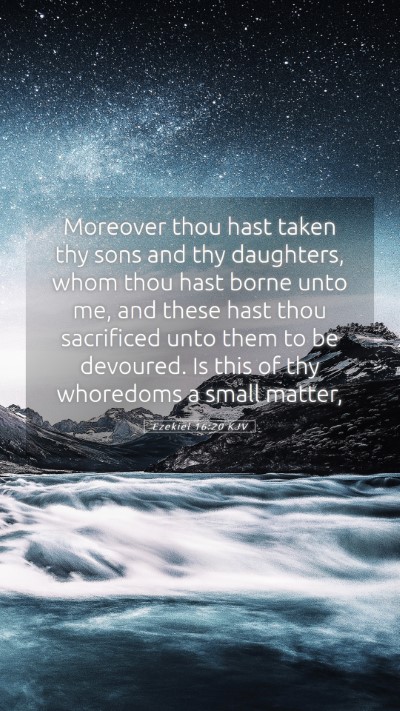Bible Verse Analysis: Ezekiel 16:20
Bible Verse: Ezekiel 16:20
Context: In this passage from the Book of Ezekiel, God, through the prophet Ezekiel, speaks about the unfaithfulness of Jerusalem, using vivid imagery to depict Israel as an unfaithful wife who has forsaken her covenant with God.
Meaning and Analysis
This verse reads, "And you took your sons and your daughters whom you had borne to Me, and these you sacrificed to them to be devoured." (Ezekiel 16:20, NKJV). The profound implications of this statement reveal the depth of Israel's rebellion against God.
- Relational Betrayal: The use of familial language highlights the intimate relationship between God and His people. Just as a spouse is expected to remain faithful, God expected Israel to uphold their commitment. Matthew Henry notes that this imagery underscores the severity of their betrayal.
- Child Sacrifice: The act of sacrificing children denotes the ultimate form of betrayal and abandonment of divine covenant. Albert Barnes emphasizes that this illustrates the extent of Israel's idolatry and moral decline.
- Symbolic Actions: Adam Clarke points out that the children represent blessings that God granted to Israel. By sacrificing them, the Israelites are essentially renouncing the very gifts bestowed upon them by God, which highlights their ingratitude.
Spiritual and Theological Implications
This passage serves as a stark warning about the dangers of idolatry and the moral decay that can accompany it. The implications extend beyond the historical context of Israel, prompting reflections on contemporary spiritual life.
Key Insights:
- Idolatry's Cost: Ezekiel presents a dire picture of what happens when a nation turns from God. The spiritual price of idolatry is not just personal loss but societal decay.
- Covenant Relationship: This verse calls believers to consider the seriousness of their commitments to God and the responsibilities that come with them.
- Generational Consequences: The mention of sacrifices involving children illustrates how the actions of one generation can impact the fate of future generations.
Application for Today
Understanding Scripture requires reflective interpretation of verses like Ezekiel 16:20. Below are ways to apply these insights:
- Reflection: Consider what modern-day idols might lead believers away from their relationship with God.
- Commitment to Faith: Reaffirm personal commitments to God, remaining vigilant against influences that may divert focus from spiritual growth.
- Community Influence: Engage in Bible study groups to discuss such passages and discern their relevance in today’s society.
Cross References
- Psalm 106:37-38: This passage discusses the Israelites sacrificing their children to demons, echoing similar themes of betrayal to God.
- Jeremiah 7:31: Another reference to child sacrifice, highlighting the abomination that such acts represent to God.
- Leviticus 18:21: A clear command against the practice of child sacrifice, emphasizing God’s hatred for such acts.
Conclusion
Understanding Ezekiel 16:20 provides a profound insight into the nature of betrayal against God and the severe implications of such actions. As we delve into Bible study insights through practices like online Bible study and using Bible study tools, we can uncover more about the significance of commitments in our spiritual lives and the importance of teaching the next generation about faithfulness to God.
This verse serves as a reminder of the depth of God’s love, the seriousness of our commitments, and the impact of our choices both on ourselves and on future generations.


